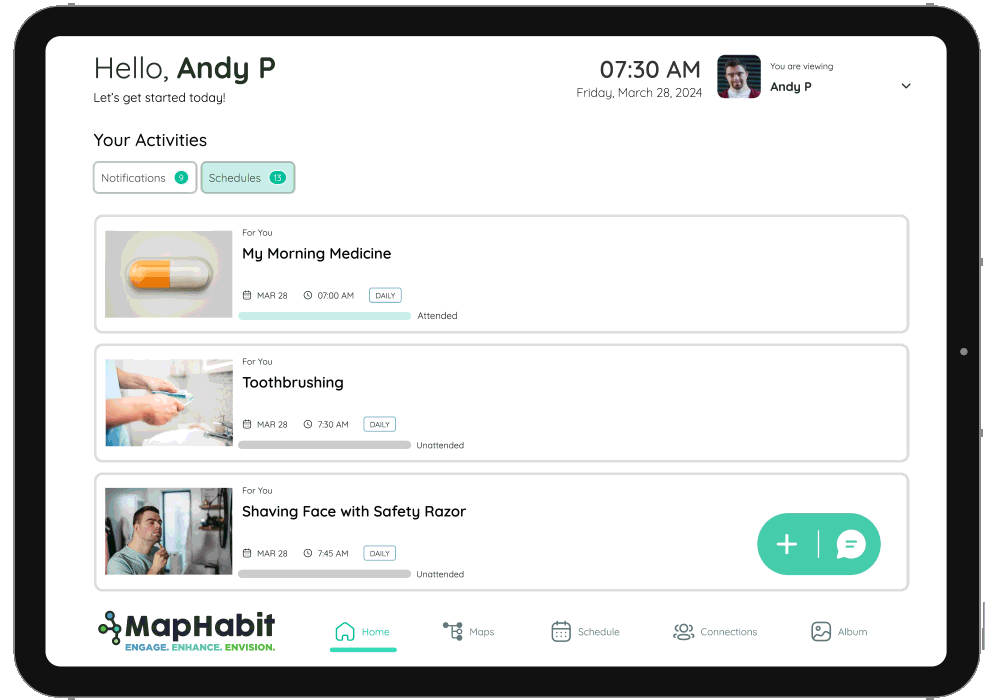MapHabit Bridges Gaps in Cognitive Support
MapHabit Co-founders Matt Golden & Stuart Zola (image: MapHabit)
America has a lot of opportunities to fill in gaps in some of its healthcare systems. Oftentimes, gaps are not realized until they directly affect us or someone close to us.
This was the experience of MapHabit CEO and Co-Founder, Matt Golden. Inspired by personal experiences — his uncle’s Alzheimer’s diagnosis and a cousin with Down syndrome — Golden identified a critical healthcare gap.
There was no accessible, affordable solution to improve the well-being of individuals requiring cognitive support, along with their caregivers.
Teaming up with neuroscientist and Co-Founder Stuart Zola, Ph.D., they created MapHabit. The evidence-based platform aims to foster autonomy and elevate quality of life for individuals with intellectual and developmental disabilities or Alzheimer’s Disease and related dementias.
What is MapHabit?
MapHabit is a patented platform dedicated to providing cognitive support through audio-visual and video step-by-step maps.
Its target users include older adults with cognitive disorders like Alzheimer’s disease and related dementias (ADRD) as well as individuals with intellectual or developmental disabilities (IDD) such as Traumatic brain injuries (TBI), autism, neurodiversity, Down syndrome, etc.
The caregivers of these individuals typically come to MapHabit in search of resources to provide exceptional care for their loved ones. MapHabit also supports self-advocates requiring additional support in their daily lives.
“Caring for a loved one who requires additional cognitive support can be both mentally and emotionally taxing. Many caregivers lack the necessary education to provide optimal care as conditions progress. This is why we created MapHabit. Our platform empowers caregivers and the individuals they support through evidence-based audio-visual cue maps that illustrate daily tasks and provide personalized reminders.”
With MapHabit, people with dementia, intellectual disabilities, or brain injuries can regain independence by completing daily activities on their own. Caregivers can communicate with other members of the support circle, learn from condition-specific resources, and take better care of themselves—all in one platform.
Achievements, Services, and Future Goals
MapHabit has been a tenant of the Centergy Building in Tech Square since 2019, as part of Georgia Tech’s renowned startup accelerator, the Advanced Technology Development Center (ATDC). With the recent developments and momentum of nearby Science Square, MapHabit hopes to collaborate with future tenants of the up-and-coming district through recruitment and potential opportunities for office space to accommodate their growing team.
“It’s been an honor to support the digital health ecosystem in Tech Square for the past five years. We’ve added several jobs since then and have employed students as well as graduates from Emory, Georgia Tech, Georgia State, and Spelman.”
MapHabit was recently added as an Evidence-Based Service in Georgia’s Department of Health’s Taxonomy and is fully reimbursable on the CMS-1915c Medicaid waiver as an enabling technology provider in Georgia.
Nationally, MapHabit just received a three year, $3.8M Commercialization Readiness Pilot (CRP) award from the National Institute on Aging (NIA), part of the National Institutes of Health (NIH) in May 2024. The grant allows MapHabit to complete three core goals:
1. Improving platform security & infrastructure
2. Further the program’s gamification capabilities & improve the end-user experience
3. Enhancing customer care processes by incorporating social determinants of health (SDOH) into the intake process
The MapHabit team is looking forward to using their latest round of funding to continue to advance in the HealthTech space.
A Beacon of Innovation and Hope
By addressing the critical needs of caregivers and individuals requiring cognitive support, MapHabit not only empowers users but also enhances their quality of life.
With ongoing advancements, including their recent recognition and funding, MapHabit is poised to further revolutionize cognitive care. Through their commitment to evidence-based solutions and community support, MapHabit is transforming the future of cognitive health for countless individuals nationwide.
To learn more about MapHabit, visit https://maphabit.com/ or contact support@maphabit.com.





